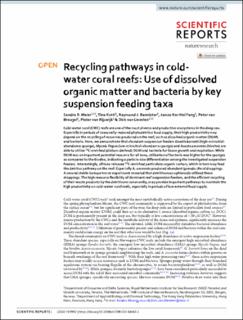Recycling pathways in cold-water coral reefs: Use of dissolved organic matter and bacteria by key suspension feeding taxa
Maier, Sandra R.; Kutti, Tina; Bannister, Raymond; Fang, James Kar-Hei; van Breugel, Peter; van Rijswijk, Pieter; Van Oevelen, Dick
Peer reviewed, Journal article
Published version
Permanent lenke
https://hdl.handle.net/11250/2685264Utgivelsesdato
2020Metadata
Vis full innførselSamlinger
- Articles [3012]
- Publikasjoner fra CRIStin [3070]
Sammendrag
Cold-water coral (CWC) reefs are one of the most diverse and productive ecosystems in the deep sea. Especially in periods of seasonally-reduced phytodetritus food supply, their high productivity may depend on the recycling of resources produced on the reef, such as dissolved organic matter (DOM) and bacteria. Here, we demonstrate that abundant suspension feeders Geodia barretti (high-microbial-abundance sponge), Mycale lingua (low-microbial-abundance sponge) and Acesta excavata (bivalve) are able to utilize 13C-enriched (diatom-derived) DOM and bacteria for tissue growth and respiration. While DOM was an important potential resource for all taxa, utilization of bacteria was higher for the sponges as compared to the bivalve, indicating a particle-size differentiation among the investigated suspension feeders. Interestingly, all taxa released 13C-enriched particulate organic carbon, which in turn may feed the detritus pathway on the reef. Especially A. excavata produced abundant (pseudo-)fecal droppings. A second stable-isotope tracer experiment revealed that detritivorous ophiuroids utilized these droppings. The high resource flexibility of dominant reef suspension feeders, and the efficient recycling of their waste products by the detritivore community, may provide important pathways to maintain the high productivity on cold-water coral reefs, especially in periods of low external food supply.
